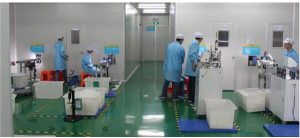In today’s demanding industries, finding reliable, high-performance materials is paramount. When it comes to fluid and gas transfer, few solutions rival the versatility and problem-solving capabilities of thin-wall silicone tubing. This remarkable material, praised for its flexibility, durability, and unique chemical properties, has become an indispensable component across a wide range of sectors.
This blog post dives into seven industries where thin wall silicone tubing isn’t just a component—it’s a game-changer. We’ll explore real-world examples of how its unique properties address specific industry pain points, leading to improved safety, efficiency, and product quality.
![]()
Medical & Pharmaceutical: A Lifeline of Purity and Precision
The Challenge: Few industries demand as much precision and purity as the medical and pharmaceutical sectors. Delivering accurate dosages in critical care settings, ensuring biocompatibility, and maintaining sterility during drug manufacturing are non-negotiable requirements.
The Silicone Solution: Medical grade silicone tubing provides a reliable and safe solution for fluid and gas transfer in a multitude of medical applications. Its exceptional biocompatibility minimizes the risk of adverse reactions, making it suitable for long-term implantation or contact with sensitive bodily fluids.
![]()
- Intravenous Therapy: Thin-wall silicone tubing with precise inner diameters like 1 inch ID tubing or smaller sizes such as 2mm silicone tubing enables accurate and controlled delivery of medications and fluids directly into the bloodstream. Its flexibility allows for comfortable patient movement, while its resistance to kinking prevents interruptions in flow.
- Catheterization: Silicone’s smooth, non-stick surface makes it ideal for catheters used for drainage, administration of medications, and other vital procedures. Its ability to be sterilized using methods like autoclaving ensures patient safety and reduces the risk of infection.
- Drug Delivery Systems: Precisely calibrated small diameter silicone tubing is crucial for delivering accurate dosages in drug delivery systems, including insulin pumps, pain management devices, and implantable drug reservoirs.
- Pharmaceutical Manufacturing: Sterility and purity are paramount in pharmaceutical manufacturing processes. Silicone tubing’s resistance to bacterial growth and its compatibility with various sterilization methods make it an ideal choice for transferring pharmaceutical ingredients and final products.
Food & Beverage Processing: A Recipe for Safety and Efficiency
The Challenge: The food and beverage industry operates under strict hygiene regulations, demanding materials that ensure product safety and prevent contamination. Maintaining flavor and odor integrity while handling temperature variations during processing adds another layer of complexity.
The Silicone Solution: Food grade silicone tubing, meticulously crafted to meet stringent industry standards like FDA 21 CFR 177.2600, provides the ideal solution for transporting liquids and ingredients in food processing.
- Dairy Processing: Specialized dairy tubing, like Dairy-Flex silicone milk tubing, withstands the rigors of milk processing, ensuring the safety and quality of dairy products from farm to table. Its resistance to bacterial growth prevents spoilage, while its ability to withstand repeated cleaning cycles contributes to efficient operations.
- Beverage Dispensing: Silicone tubing’s clarity and flexibility make it perfect for beverage dispensing systems in restaurants, cafes, and vending machines. Larger sizes like 1 inch silicone hose are often used for high-volume dispensing, while smaller options provide precise control for specialty drinks.
- Bakery Equipment: Silicone’s heat resistance is a key advantage in bakery applications. It can withstand the high temperatures of ovens and proofers without degrading, ensuring the consistent quality of baked goods.
- Brewery & Winery Operations: Silicone tubing’s inert nature ensures it doesn’t impart unwanted flavors or odors to delicate beverages like wine or beer. Its chemical resistance allows it to handle cleaning agents and sanitizers without compromising its integrity.
Laboratory & Research: Precision for Scientific Breakthroughs
The Challenge: Scientific research and analysis demand precise measurements, reliable data, and materials that won’t interfere with sensitive experiments. Handling corrosive chemicals, maintaining sterility, and ensuring accurate fluid transfer are essential for achieving reliable results.
The Silicone Solution: Thin wall silicone tubing, with its exceptional chemical resistance and purity, plays a vital role in laboratory settings. Its ability to withstand a wide range of temperatures, from cryogenic applications to high-temperature processes, makes it suitable for diverse research needs.

- Analytical Chemistry: The inert nature of silicone tubing prevents it from reacting with sensitive reagents or samples, ensuring accurate analysis. Its transparency allows for visual monitoring of fluid flow, crucial for precise experiments.
- Chromatography: Silicone tubing is widely used in chromatography techniques, where its low extractables and bleed characteristics minimize interference with sample analysis. Its consistent inner diameter ensures accurate flow rates, critical for separation and identification of compounds.
- Cell Culture: Sterile silicone tubing is essential for maintaining cell cultures, providing a contamination-free environment for cell growth and experimentation.
- Microfluidics: Miniaturized lab-on-a-chip devices often utilize small bore silicone tubing and ultra-thin wall silicone tubing to manipulate tiny volumes of fluids for advanced research in areas like diagnostics and drug development.
Aerospace: Soaring to New Heights of Reliability
The Challenge: The aerospace industry faces some of the most extreme environmental conditions, from sub-zero temperatures at high altitudes to intense heat and pressure variations during flight. Materials used in aircraft must be lightweight yet incredibly robust to ensure safety and performance.
The Silicone Solution: Specialized thin-wall silicone tubing, often reinforced with braids or other strengthening materials, plays a vital role in various aerospace systems.
![]()
- Fuel Lines: Silicone’s ability to withstand extreme temperatures and its resistance to degradation from aviation fuels make it suitable for fuel lines in aircraft. Its flexibility allows for installation in confined spaces, while its durability ensures long-term reliability.
- Hydraulic Systems: Silicone tubing’s ability to handle high pressures and its low compression set make it ideal for hydraulic lines in aircraft control systems. Its resistance to leaks and its ability to maintain performance under demanding conditions contribute to flight safety.
- Ventilation & Cabin Air Systems: Silicone tubing’s flexibility and resistance to ozone and UV degradation make it suitable for ventilation and cabin air systems. Its low odor and taste properties ensure passenger comfort.
- Oxygen Systems: Silicone tubing’s biocompatibility and ability to withstand sterilization make it suitable for use in oxygen delivery systems for pilots and passengers.
Automotive: Driving Performance Under Pressure
The Challenge: The automotive industry demands materials that can withstand the harsh conditions under the hood, from the extreme heat of the engine to exposure to oil, coolants, and other automotive fluids. Components must be durable, resistant to vibration, and able to maintain performance over time.
The Silicone Solution: Silicone hose, available in various sizes, including commonly used options like 1 inch ID silicone hose, is a popular choice for a variety of automotive applications.
![]()
- Coolant Systems: Silicone hose’s ability to withstand high temperatures and its resistance to degradation from coolants make it ideal for use in radiator hoses and other cooling system components. Its flexibility allows for easy installation and its long lifespan reduces maintenance needs.
- Turbocharger Systems: High-performance turbocharged engines require hoses that can handle the intense heat and pressure of turbocharger systems. Heat-resistant silicone hose, often reinforced for added strength, provides the necessary durability and reliability.
- Emissions Control: Silicone tubing is used in emissions control systems, including EGR (exhaust gas recirculation) systems, due to its resistance to high temperatures and corrosive exhaust gases.
- Vacuum Lines: Silicone tubing is often used for vacuum lines due to its flexibility, durability, and resistance to collapse under vacuum pressure.
Industrial Automation: The Backbone of Efficient Processes
The Challenge: Industrial automation relies on precise and reliable fluid and gas transfer for a variety of processes, from pneumatic controls to hydraulic systems. Materials used in automated systems must be durable, flexible for tight installations, and resistant to chemicals and abrasion.
The Silicone Solution: Thin-wall silicone tubing, with options for braid reinforcement or other strengthening materials, provides a versatile solution for industrial automation applications.
![]()
- Pneumatic Systems: Compressed air systems, widely used in industrial automation, rely on silicone tubing for its flexibility, ability to withstand pressure fluctuations, and resistance to kinking.
- Hydraulic Systems: Silicone hose, capable of handling high pressures, is used in hydraulic systems to power actuators, cylinders, and other components in industrial machinery. Its flexibility allows for routing through complex systems.
- Chemical Processing: Silicone tubing’s resistance to a wide range of chemicals makes it suitable for transferring corrosive or reactive fluids in chemical processing plants.
- Robotics: Silicone tubing, often in smaller diameters, is used in robotic arms and end-effectors for fluid and pneumatic control, contributing to the precision and flexibility of robotic movements.
3D Printing: Shaping the Future of Manufacturing
The Challenge: 3D printing, also known as additive manufacturing, relies on precise and controlled extrusion of materials to create three-dimensional objects. Maintaining material flow consistency, handling viscous materials, and ensuring smooth operation are crucial for high-quality 3D printing results.
The Silicone Solution: Thin-wall silicone tubing, often in small diameter silicone tubing sizes, plays a vital role in 3D printer filament feed systems.
![]()
- Filament Extrusion: Flexible silicone tubing guides the filament (the printing material) from the spool to the printer’s extruder head, ensuring smooth and consistent material flow. Its low friction properties reduce resistance and prevent filament jams.
- Temperature Resistance: Silicone tubing’s ability to withstand the high temperatures associated with 3D printing processes, particularly for high-performance materials, ensures reliable operation and prevents degradation.
- Chemical Compatibility: Silicone tubing is compatible with a wide range of 3D printing filaments, including PLA, ABS, and more specialized materials like nylon and PEEK. Its inert nature prevents chemical reactions that could affect print quality.
- Durability: The repeated flexing and movement of filament through the tubing requires a durable material. Silicone’s resilience ensures a long lifespan, reducing downtime and maintenance needs for 3D printers.
Conclusion: The Adaptable Power of Thin Wall Silicone Tubing
From delivering life-saving medications to shaping the future of manufacturing, thin wall silicone tubing plays a vital role across numerous industries. Its adaptability, durability, and ability to meet stringent requirements make it the go-to solution for a wide range of applications. Whether you need biocompatible medical tubing, food-grade hoses for processing, or high-temperature resistant lines for aerospace, silicone tubing provides reliable performance and consistent quality.


